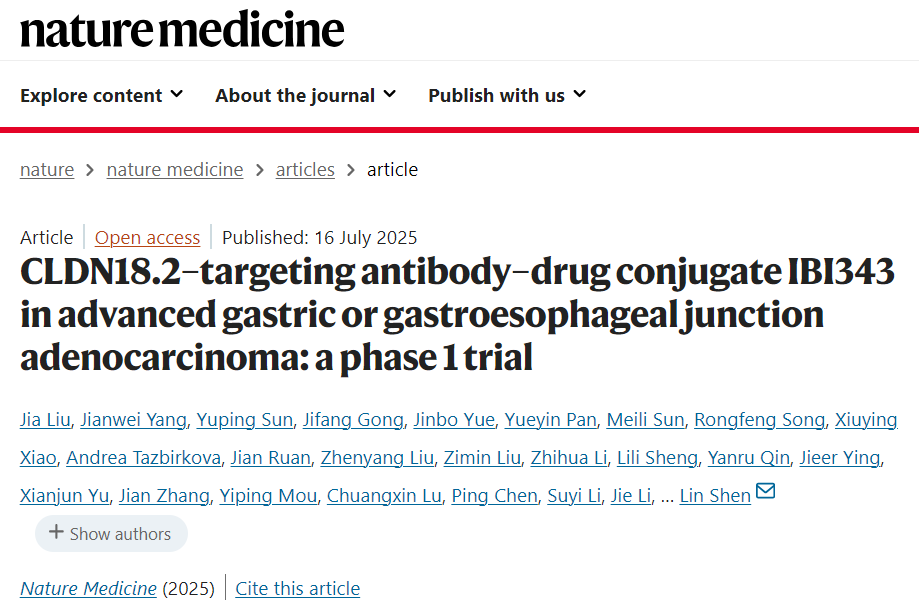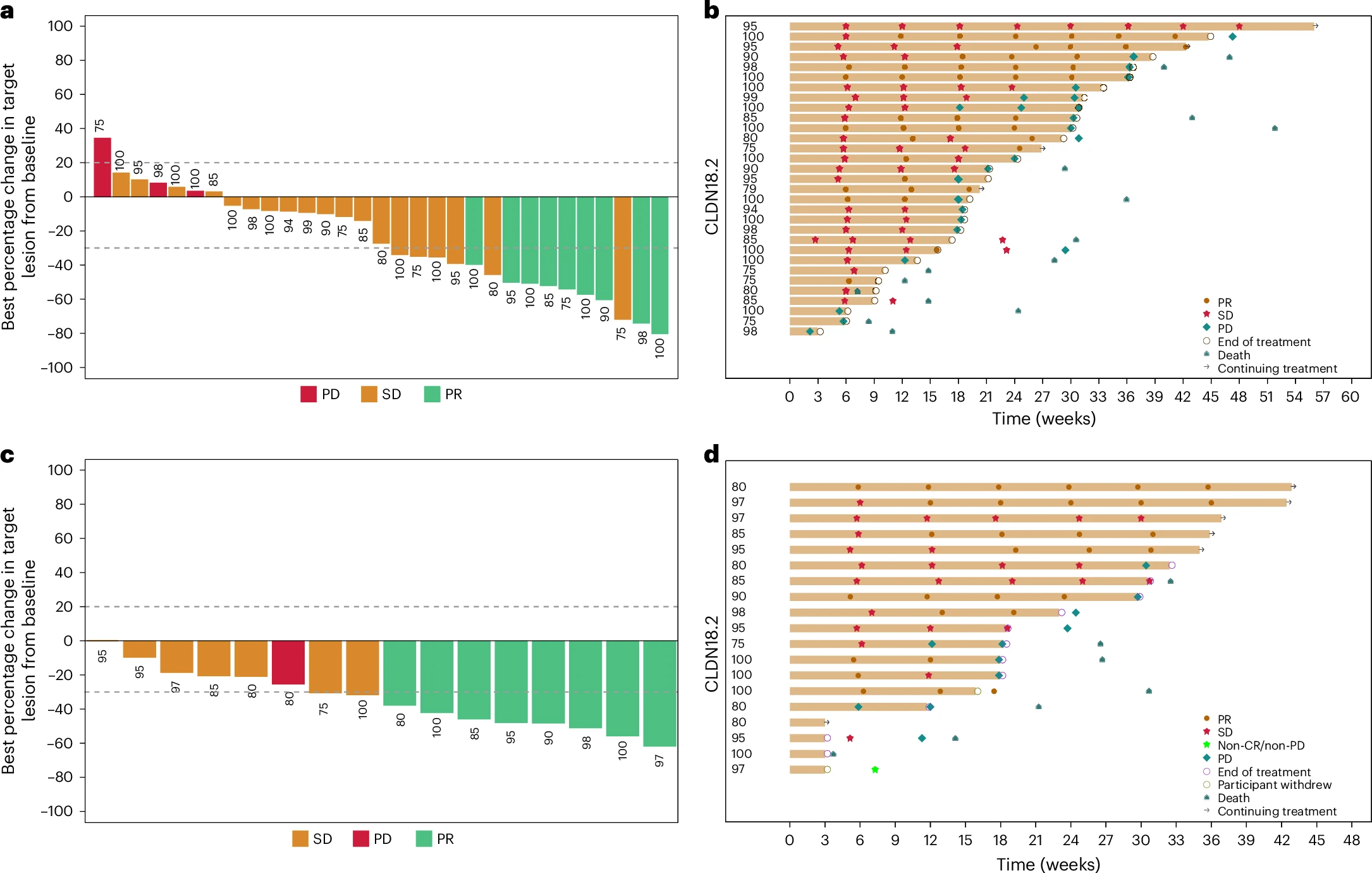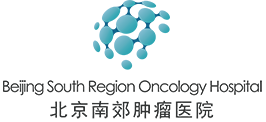July 17, 2025 – Innovent Biologics announced that Nature Medicine has published the results of the Phase 1 clinical study of IBI343, an innovative anti-CLDN18.2 ADC, for the treatment of advanced gastric/gastroesophageal junction (G/GEJ) adenocarcinoma. Publication in this leading international academic journal indicates the strong recognition of the therapy’s clinical potential and marks another significant milestone in China’s progress in developing novel anti-tumor medications. Based on the study findings, a multi-regional Phase 3 clinical trial (G-HOPE-001, NCT06238843) was launched in 2024 to further evaluate IBI343 as a safe and effective treatment option for patients with advanced G/GEJ AC.

At present, there are still many clinical trials of new anti-cancer technologies in China seeking patients. Consultation on new drugs and technologies, you can contact Beijing South Region Oncology Hospital International Department.
Phone Number:4008803716
WeChat ID: 17801183037
Email:myimmnet@163.com
Gastric cancer remains one of the most common malignant tumors in the world. According to the GLOBOCAN 2022 statistics, it ranks as the fifth most common malignant tumor and the fifth leading cause of cancer-related death globally, with an estimated 970,000 new cases and 660,000 deaths annually. Each year, China reports 359,000 new cases and 260,000 deaths from gastric cancer, representing 37.0% and 39.4% of global totals, respectively, highlighting a significant unmet medical need.
CLDN 18.2 is a tight junction protein expressed in differentiated epithelial cells on the gastric mucosa under normal physiological conditions. Previous studies have revealed that Claudin18.2 is highly expressed in multiple types of cancer, including gastric cancer (60-80%), pancreatic cancer (50%), esophageal carcinoma (30-50%), and lung cancer (40-60%). Targeting CLDN18.2 with monoclonal antibodies (mAbs) and ADCs represents a promising new approach for treating gastric cancer.
This published study is a global, multicenter Phase 1 clinical trial (ClinicalTrial.gov identifier: NCT05458219) designed to evaluate the safety, tolerability and preliminary efficacy of IBI343 in patients with advanced solid tumors. Between October 26, 2022, and June 30, 2024, a total of 116 subjects with advanced G/GEJ adenocarcinoma were enrolled to receive IBI343 monotherapy (8 in escalation and 108 in expansion).
About IBI343(Anti CLDN18.2 ADC)
IBI343 is a recombinant human anti-CLDN18.2 monoclonal antibody-drug conjugate (ADC) developed by Innovent Biologics. It specifically binds to the tumor cells expressing CLDN18.2, triggering CLDN18.2-dependent internalization of the ADC. Once inside the cell, the cytotoxic payload is released, resulting in DNA damage and ultimately apoptosis of the tumor cells. The released drug can also diffuse across the plasma membrane to reach and kill neighboring cells, resulting in a “bystander killing effect”.
As an innovative TOPO1i ADC, IBI343 has demonstrated tolerable safety and encouraging efficacy signals in this Phase 1 clinical studies. The therapeutic potential of IBI343 is currently being explored in tumor types such as gastric cancer and pancreatic cancer.
The multi-regional Phase 3 clinical trial of IBI343 for advanced gastric / gastroesophageal junction adenocarcinoma is now recruiting patients (G-HOPE-001, NCT06238843). The relevant indication has been granted Breakthrough Therapy Designation (BTD) by China’s NMPA .
The multi-regional Phase 1 clinical trial of IBI343 for advanced pancreatic ductal adenocarcinoma is also enrolling patients (NCT05458219). This indication has received Fast Track Designation (FTD) from the U.S. FDA and been granted BTD by China’s NMPA.
IBI343 has demonstrated encouraging tumor response and survival benefit
The study analyzed the efficacy data of evaluable subjects with high expression of CLDN18.2 (≥75% tumor cells with membranous staining intensity ≥2+ by IHC), in the two dose groups of 6 mg/kg and 8 mg/kg.
At 6 mg/kg (N=31), 15 patients had partial responses (PR) including 9 patients with confirmed PRs and 1 patient awaiting confirmation. The confirmed ORR was 29.0% (95% CI: 14.2-48.0) and the disease control rate (DCR) was 90.3% (95% CI: 74.2-98.0). In 9 patients with confirmed response, the median duration of response (DoR) was 5.6 months (95% CI: 2.8-7.0). The median follow-up was 10.6 months (95% CI: 9.7-11.5) for PFS and OS. The median PFS was 5.5 months (95% CI: 4.1-7.0). OS data was not mature with the current median OS of 10.8 months (95% CI: 6.8-NC). After data cutoff, response of the remaining 1 patient was confirmed on July 26, 2024 and the confirmed ORR was updated to 32.3% (95% CI: 16.7-51.4).
At 8 mg/kg (N=17), 17 patients with high expression of CLDN 18.2 were evaluable. Among them, 9 patients had PRs including 8 patients had confirmed PR. The confirmed ORR 47.1% (95% CI: 23.0-72.2), and the DCR was 88.2% (95% CI: 63.6-98.5). In eight patients with confirmed response, the median DoR was 5.7 months (95% CI: 2.7-NC). Of all G/GEJ adenocarcinoma patients with high CLDN18.2 expression treated at 8 mg/kg (N=19, including 1 patient from dose escalation and 18 patients from dose expansion), the median follow-up was 8.1 months (95% CI: 7.6-8.5) for PFS and OS. The median PFS was 6.8 months (95% CI: 2.8-7.5), and the median OS was not reached with events occurred in 36.8% patients.

IBI343 also demonstrated superior safety
Among all patients with G/GEJ adenocarcinoma (n=116, including 8 patients with gastric cancer from the dose escalation phase), 66.4% patients (77/116) had ≥3 grade TEAEs. The most common ≥3 grade TEAEs (≥35%) were neutrophil count decreased (28.4%), white blood cell count decreased (25.9%), and anemia (16.4%). There were very few grade ≥3 gastrointestinal adverse events, including only 1.7% of grade ≥3 nausea. No interstitial lung disease of any grade was reported. Treatment-related toxicity was alleviated with adequate supportive treatment, and the overall safety was tolerable.
At present, there are still many clinical trials of new anti-cancer technologies in China seeking patients. Consultation on new drugs and technologies, you can contact Beijing South Region Oncology Hospital International Department.
Phone Number:4008803716
WeChat ID: 17801183037
Email:myimmnet@163.com
Post time: Jul-22-2025

